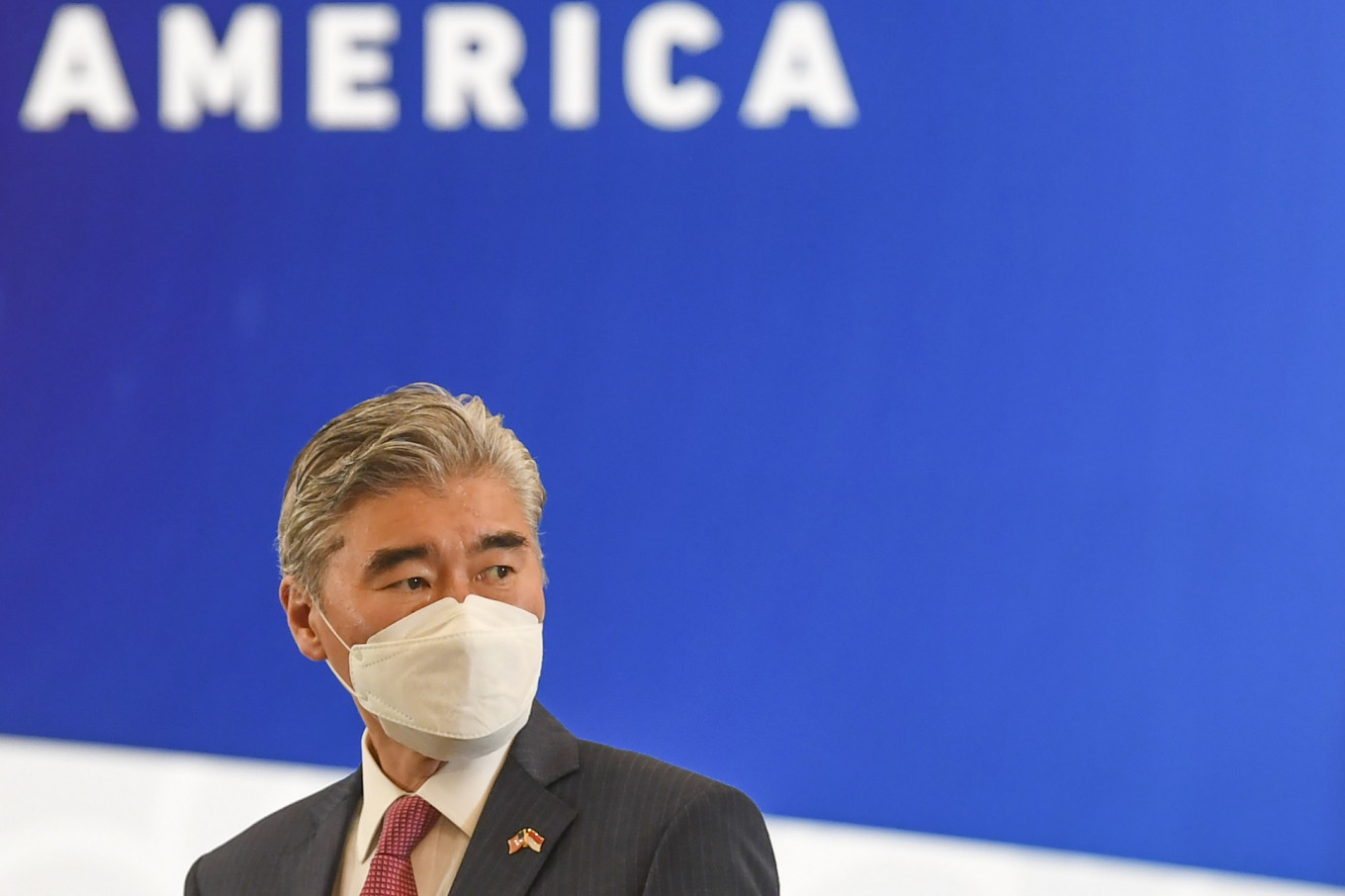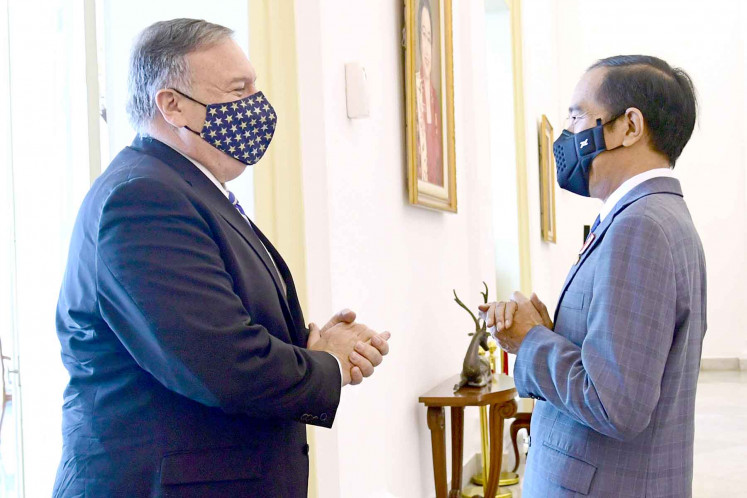Popular Reads
Top Results
Can't find what you're looking for?
View all search resultsPopular Reads
Top Results
Can't find what you're looking for?
View all search results‘New old friend’: Indonesia upbeat on US ties, regardless of election winner
Indonesia has resisted last-minute lobbying by the United States over China ahead of the crucial US presidential election, while also coming away in a better position to deal with Washington.
Change text size
Gift Premium Articles
to Anyone
 United States Ambassador to Indonesia Sung Yong Kim attends an event hosted by GP Ansor, the youth wing of Indonesia's largest Islamic organization Nahdlatul Ulama, in Jakarta on Saturday. During the event, US Secretary of State Mike Pompeo gave a speech about religious diversity and called on Indonesian Muslims to speak up over China's alleged human rights abuses against the Uighur minority. (Antara/Galih Pradipta)
United States Ambassador to Indonesia Sung Yong Kim attends an event hosted by GP Ansor, the youth wing of Indonesia's largest Islamic organization Nahdlatul Ulama, in Jakarta on Saturday. During the event, US Secretary of State Mike Pompeo gave a speech about religious diversity and called on Indonesian Muslims to speak up over China's alleged human rights abuses against the Uighur minority. (Antara/Galih Pradipta)
I
ndonesia’s newly appointed envoy to the United States, Muhammad Lutfi, said the two countries would stand as equals as “new old friends” who shared values and norms, as the Southeast Asian nation resisted last-minute US lobbying on China ahead of the US presidential election.
Speaking days ahead of the high-profile US election, Lutfi said US-Indonesian ties were rejuvenated by two key recent events, namely the visits of Defense Minister Prabowo Subianto to the US and the extension of Indonesia's General System of Preferences (GSP) status.
He went on to say that he would try his hardest to translate better trade with the US into investments.
"I am sure that whoever is next elected US president, whether it’s Joe Biden from the Democrats or President [Donald] Trump from the Republicans, will have confirmed that there are many breakthroughs with Indonesia, including an increase in Indonesian exports," he told reporters in an online briefing late Monday in Jakarta.
The ambassador’s comments come ahead of what observers are calling some of the most crucial US elections in recent history, held at a time when tensions between the US and China are becoming more palpable.
The Trump administration has made it a point to antagonize China as part of its ongoing rivalry with Beijing, which has spilled over into various issues, from the upcoming election and global public health, to a trade war and even regional security.
The latter was laid out in full view last week when US Secretary of State Mike Pompeo toured parts of Asia – from India, Sri Lanka, the Maldives, Indonesia and Vietnam – to promote Indo-Pacific cooperation.
However, in keeping with its "free and active foreign policy", Indonesia has remained adamant about keeping the region neutral in the midst of the superpower struggle.
Economy First
Foreign Minister Retno Marsudi assured Pompeo of Indonesia’s and ASEAN's commitments to maintaining peace, stability and prosperity in the region, in line with the ASEAN Outlook on the Indo-Pacific (AOIP) – adopted last year by ASEAN in response to the vested interests being pursued by other countries. The AOIP instead promotes an "open, inclusive, transparent and rules-based" order.
With Pompeo, Retno referred back to a regional statement from early August that cited a Cold War-era declaration of neutrality signed by all members of ASEAN.
International relations expert Suzie Sudarman from the University of Indonesia noted that Indonesia’s foreign policy was based on a longstanding tradition Indonesia was not prepared to break anytime soon.
When Pompeo paid President Joko "Jokowi" a courtesy call on Thursday, the Indonesian leader emphasized concrete cooperation, including in the economic sector, Retno told reporters afterwards.
“If [Jokowi] deviates a little, he would certainly be accused of violating such principles. It is a symbol – such political commitments like accepting American planes or ships would be too obvious, but economic cooperation isn't that visible,” Suzie told The Jakarta Post over the weekend.
Reuters reported last month that Jokowi had turned down Washington’s request to allow a maritime surveillance aircraft to land and refuel in the archipelagic nation.
Politically, Lutfi said hegemonic competition between the US and China was very worrying but he was confident that both Indonesia and the US had learned from past experience and history.
"I believe Indonesia and the US have their own interests in the region. [Singapore's] Prime Minister Lee Hsien Loong said if war broke out in the region, especially in the South China Sea, the loser would be the countries in the region, and the Asian century would pass. Indonesia as a country in the region would lose the opportunity to create prosperity for its people, which is very important for the democracies in the region" he said.
United States Secretary of State Mike Pompeo (left) talks with President Joko "Jokowi" Widodo during their meeting in Bogor, on Oct. 29. ( Indonesian Presidential Palace/ Muchlis Jr )Catching up
Pompeo’s visits to Indo-Pacific countries come just ahead of US election day on Tuesday, with Trump seeking reelection against Biden. The issue of China and the origin of the virus in Wuhan has been among the hot-button issues that the incumbent leader has tried to highlight as the US failed to control the spread of the virus.
China, for its part, has proven itself a defender of global free trade and multilateralism, two tenets that have been all but abandoned by the Trump administration. However, Beijing's ambiguity when it comes to the rule of law and human rights has countries in and outside the region worried, experts have said.
During an event hosted on Thursday by GP Ansor, the youth wing of Indonesia's largest Islamic organization, Nahdlatul Ulama, Pompeo called on Indonesian Muslims to speak up over China's alleged human rights abuses against its Muslim Uighur minority.
The question of whether Trump would get a second term or would be replaced by Biden is a factor that Indonesian officials have paid particularly close attention to, although Suzie insisted that challenges remain even if the election results in a change of administration in Washington.
“The anti-China [narrative] will likely remain. Even if he won, Biden would have done the same thing, because the US has a lot to catch up to,” she said.
As Indonesian officials quietly lobby both sides of the aisle in Washington, US foreign policy under Trump has largely neglected Southeast Asia, only returning focus to the region in earnest in the past year, driven by its rivalry with China, which has made inroads with its Belt and Road initiative and other economic cooperation in the region.
Pompeo wrapped up his trip in Vietnam on Friday, where he urged Southeast Asian countries to stand up to Chinese pressure and to reassess business deals with its state firms.
“We look forward to continuing to work together to build on our relationship and to make the region – throughout Southeast Asia, Asia and the Indo-Pacific – safe and peaceful and prosperous,” Pompeo said, as quoted by Reuters.
Quad goals
Since it gained a surge of popularity in the last few years, the term “Indo-Pacific” has been received with cautious concern, especially by China, whose emerging presence is seen as a threat to some regional powers.
The Indo-Pacific is a region that straddles the Indian and Pacific oceans, where the likes of Japan, Australia and India, together with the US, have issued their own Indo-Pacific strategies.
The four regional powers are also grouped together under the Quadrilateral Security Dialogue, or the Quad, which in recent years has positioned itself as a counterweight to China.
Teuku Rezasyah from Padjadjaran University said the US and the Quad countries should continue supporting Indonesia’s free and active foreign policy and its determination to ensure that the region remains neutral.
“We do not involve ourselves in Quad affairs [and] do not want to be included in any of their scenarios, but if Indonesia becomes increasingly competitive and increasingly able to protect its territories, it can benefit the US and the Quad countries solely by the fact that Indonesian territory cannot be penetrated by China,” he said.










